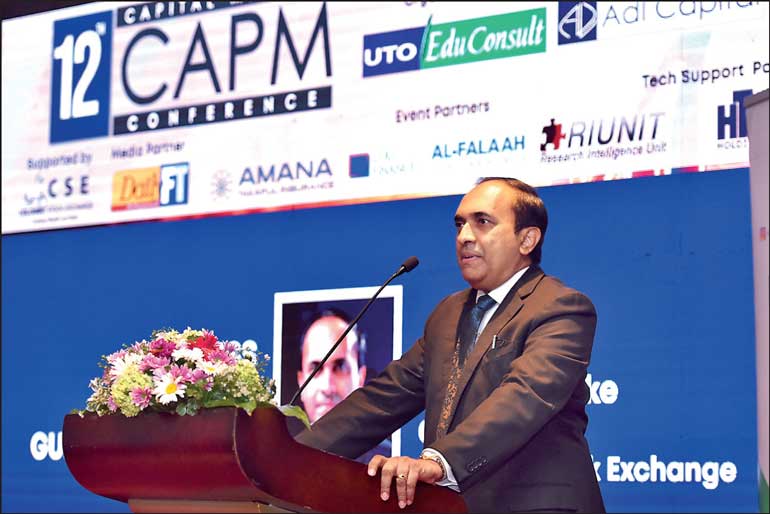Sunday Feb 22, 2026
Sunday Feb 22, 2026
Wednesday, 26 June 2024 00:18 - - {{hitsCtrl.values.hits}}

Colombo Stock Exchange CEO Rajeeva Bandaranaike - Pic by Ruwan Walpola
The Colombo Stock Exchange (CSE) Chief Executive Officer Rajeeva Bandaranaike yesterday stressed the critical need to enhance market liquidity and investor confidence.
Speaking at the 12th Capital Markets Conference, he identified several key areas for improvement: investor confidence, efficient distribution channels, and financial literacy. He asserted the urgent need for comprehensive efforts to enhance market liquidity, build investor confidence, and improve financial literacy to ensure the CSE’s growth and stability.
“Prospective investors need assurance that the market is orderly, fair, and transparent. Then, the market needs a robust sales force to promote equity products, similar to the insurance and banking sectors. Finally, strengthening financial literacy across all segments of society is essential. Many potential investors are hesitant due to a lack of understanding of the stock market and the concepts of risk and return,” he explained.
Highlighting challenges with new products, he said the introduction of new financial products like derivatives and exchange-traded funds (ETFs) is hindered by the lack of a deep cash market. “A study by an expert from the Korea Stock Exchange concluded that the current equity market is not sufficiently deep to support equity derivatives,” he added.
Highlighting current challenges and potential solutions, Bandaranaike stressed that increasing the public float and incorporating larger, more liquid companies are crucial steps towards building a liquid secondary market.
He said a liquid market is essential for accurate share price discovery. “Without sufficient liquidity, share prices can be distorted, and the price discovery mechanism becomes inefficient. This inefficiency discourages companies from listing, as they cannot reliably discover a fair price for their shares,” he pointed out.
Bandaranaike also noted the low levels of investor participation as a significant challenge. “The CSE has nearly one million CDS accounts from a bankable population of 14 million, but only 260,000 of these accounts have a portfolio. Of these, just 25% hold shares, and only 7% are active. On average, 20,000 investors trade at least once a month, down from 33,000 last year and 42,000 in 2021,” he said.
Bandaranaike pointed out that the CSE’s turnover velocity, which measures market turnover relative to market capitalisation, stands at 9%. This is a decline from 10% last year and a significant drop from 27% in 2021. In comparison, Bursa Malaysia boasts a turnover velocity of 58%, NSE India 72%, Dhaka 45%, Pakistan 51%, and Vietnam 96%.
He said the daily average of trades has also seen a decline, with 13,000 trades this year compared to 14,000 last year and 33,000 in 2021. “Share trading volume followed a similar trend, with 16 million shares traded this year, down from 30 million in 2022 and 60 million in 2021,” he pointed out.
Reflecting on the CSE’s 40-year history, Bandaranaike noted that supply often spurs demand. He cited the example of Dialog’s IPO 20 years ago, which attracted 22,000 new accounts. “This underscores the power of good IPOs in driving market participation,” he added.